Prison, exile, impeachment: The scandalous history of South Korea's presidents
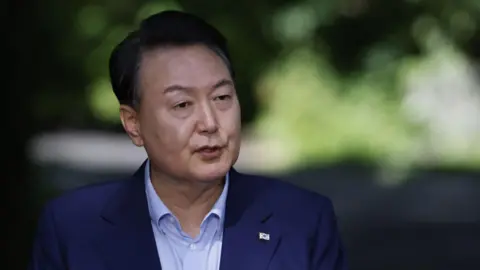 Getty Images
Getty ImagesYoon Suk Yeol, who was officially removed from office on Friday, follows a line of former South Korean leaders who have had their reputations marred or terms interrupted by scandal.
Among them are presidents who have faced indictment, exile and imprisonment.
Yoon, who was South Korea's public prosecutor, in fact led a probe that landed former president Park Geun-hye in prison.
Now apart from being impeached, Yoon is also being investigated for treason over his botched martial law attempt last December. Some analysts believe that, ironically, the move was driven by his fear of prosecution.
Here is a list of former South Korean presidents whose political careers ended dramatically.
Forced into exile
Before he became South Korea's first president, Syngman Rhee spent some three decades as a pro-independence activist against Japanese rule.
But his presidency was polarising.
While some respect him for having laid the foundations for a modern country after World War Two, critics condemn his authoritarian streak. Shortly after his inauguration in 1948, he implemented laws to curtail political dissent; he has also been blamed for the killing of civilians during the Korean War.
The opposition rejected Rhee's re-election in 1960 and accused him of rigging the vote. This escalated into violent student-led protests, which saw some demonstrators shot dead by police, and ultimately forced Rhee to resign.
Rhee left the country for Hawaii in May that year, where he died in 1965.
Assassinated by close aide
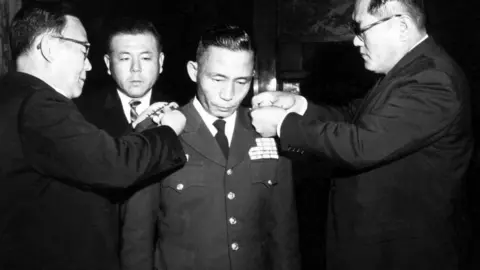 Getty Images
Getty ImagesBorn to a poor rural family in the early years of the Japanese occupation, Park Chung-hee joined the military and was posted to Manchuria (a historical region of north-eastern China) where he served until the Japanese surrendered.
Park led a coup in 1961 to overthrow Rhee's successor, Chang Myon, and later became president. Park led the country for 18 years through a period of rapid economic development known as the "miracle on the Han river". It was during this time that the government opened doors to foreign investment, while also helping to develop now-famous conglomerates like Hyundai, LG and Samsung.
However, he moved towards greater authoritarianism later in his term. In 1972, he suspended the constitution, dissolved the National Assembly and made himself "president for life".
Despite Park's economic achievements, South Korea in the 1970s was rocked by growing protests against his iron-fisted rule, where dissenters were brutally punished.
Park was assassinated at a dinner party in October 1979 by his own spy chief and lifelong friend Kim Jae-kyu.
Jailed for treason, a coup and a massacre
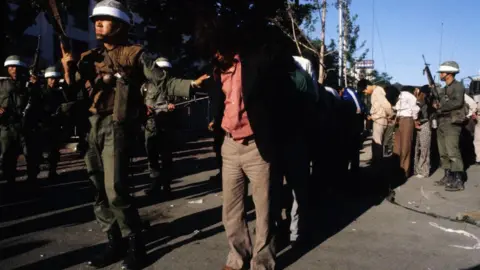 Getty Images
Getty ImagesMilitary commander Chun Doo-hwan gained power in 1980 after yet another coup. He presided over a brutal military crackdown in the south-western city of Gwangju, which at the time was the centre of an uprising against martial law in South Korea. More than 200 pro-democracy demonstrators were either killed or disappeared.
During Chun's term, the country saw growth rates hovering around 10% each year. However, he is mostly remembered as a dictator who was unapologetic till the end.
In 1983, Chun survived an assassination attempt orchestrated by North Korea forces, who bombed a ceremony he was at during a state visit to Myanmar. The attack killed 21 people and injured dozens more.
In 1988, Chun picked his coup comrade Roh Tae-woo, also a former general, as his successor.
The pair were convicted in 1996 of corruption, as well as their roles in the coup and the Gwangju massacre. Defending the coup while on trial, Chun said he "would take the same action, if the same situation arose".
Chun was handed a death sentence - which was later commuted to life imprisonment - while Roh was sentenced to 17 years in jail. Both men were pardoned in 1997 after serving just two years in prison.
Took his own life during a bribery probe
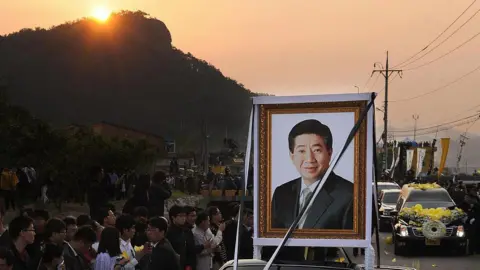 Getty Images
Getty ImagesBorn to a poor family, Roh Moo-hyun educated himself and passed the bar exam to become a lawyer without having attended law school. He was appointed a judge in 1977 but later left the bench to become a human rights lawyer, where he advocated for student activists accused of being pro-communist.
In 2002, Roh won the presidential election as an underdog, with early polls giving him just 2% of the vote. He tried to shape South Korea as a "middle power" among other stakeholders in the region, and championed a so-called sunshine policy of engaging North Korea with trade and aid shipments.
After leaving office in 2007, he returned to his hometown in the south-east and ran a duck farm. However, he took his own life 14 months later, as corruption investigators closed in over allegations he accepted $6m in bribes.
Public opinion on Roh improved considerably after his death. Polls by Gallup Korea have consistently ranked him the most beloved president in the country's history.
Jailed for corruption
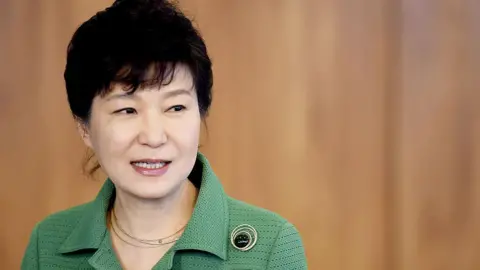 Getty Images
Getty ImagesFormer Hyundai CEO Lee Myung-bak entered politics in 1992 and was elected mayor of Seoul a decade later. He won the election by a landslide in 2007, even though a business scandal from his days at the automobile conglomerate resurfaced in the days leading up to the vote.
Lee led the country through the global financial crisis and won its bid for the 2018 Winter Olympics. His term ended in 2013, and he was succeeded by the country's first female president Park Geun-hye, who is the daughter of assassinated former leader Park Chung-hee.
The younger Park drew on her father's reputation as the man who pulled South Korea out of poverty. However, a corruption scandal involving a confidante, Choi Soon-sil - the daughter of a Shamanistic cult leader - led to her impeachment in 2016 and arrest a year later.
Five years after leaving office, Lee too was charged with bribery and later found guilty of creating slush funds of tens of millions of dollars, and taking bribes from various sources, including Samsung.
Park was handed a 22-year sentence and Lee 15 years, but both have since been pardoned.
